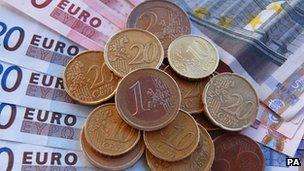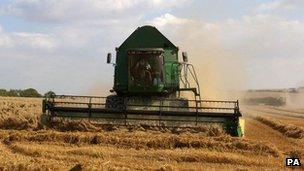'Dangerous' financial products named
- Published

The poll's organisers want the most dangerous products to be banned
Credit default swaps on emerging markets' sovereign debt and food speculation funds have been voted Europe's worst financial products.
Nearly 2,000 people took part in the Dangerous Financial Products, external poll.
The competition was created by Euro-MP Sven Giegold, who belongs to the German Green party.
Mr Giegold hopes the poll will increase citizens' awareness of new rules that allow officials to ban harmful financial products.
"Now the European Supervisory Authorities (ESAs) have to take action," he says.
Created in 2011, the ESAs were given the power to ban financial products from markets that were deemed to be a risk to the system as a whole.
It is a power they have not yet used.
Protecting consumers
The two worst products were chosen from eight finalists, which were split into two categories.
These were financial instruments said to harm the environment or the world's poor, and financial instruments that were said to harm consumers or investors directly.
The winner in the consumer category, credit default swaps (CDSs) on emerging markets' sovereign debt, received 46.8% of the vote.
CDSs first came into the public view as one of the causes of the financial collapse in 2008. They allow investors to buy protection against bond issuers defaulting on their debts. In this case, the bonds were issued to finance the debt of emerging market countries such as China or Brazil.
European authorities have already issued rules regarding CDSs on European Union countries, banning certain types that they consider risky.
"The issue here is that once a government gets in trouble, a CDS market can mean there's no way out. The same applies for emerging market governments too," wrote Will Martindale in his submission.
"It's too small a benefit for too big a risk, and there's a human impact that can't be ignored."
High-interest credit cards, which are often used by poorer consumers, were another contender, as well as reverse convertible bonds. Reverse convertible bonds allow purchasers to buy a bond in a company that may be redeemed for cash or stock, depending on how the company's shares perform during a set period.
This is risky because if a company's share price falls - or, like in the case of Lehman Brothers, if the company collapses - investors can lose a lot of money.

Food speculation funds took more than 70% of the vote
Paul Coates was hurt by the last nominated product - foreign currency mortgages.
While working in Singapore, he took out a mortgage in Japanese yen on a home he purchased in the UK.
But he says his bank did not warn him when or how they would change the way the exchange rate was calculated, and that they increased the price by more than 60%.
For him, he says it is by far the worst financial product.
Food funds
The other category under consideration involved financial products said to promote industries that harm the globe - be it the environment or the world's poor. The list included funds that invest in oil sands or "fracking" industries, as well as others that invest in uranium and silver extraction.
Ahead by a large margin - receiving more than 70% of the vote - were food speculation funds.
Geld mit Sinn e.V. and Mathias Winkler, the submitters, wrote, "Products based on food speculation are dangerous because they cause price increases of basic foodstuff. Hence these products threaten livelihoods of low-income earners and can even result in the death of those who cannot afford their food any more."
Recently, there has been a lot more demand for these types of financial products, says Morningstar analyst Alastair Kellett.
Mr Kellett says the increase has come about because there are now more products that allow over-the-counter investors access to agricultural funds. Furthermore, pension fund managers have been advised to diversify their portfolios by investing in these products.
This increased appetite to invest in the future prices of commodities such as corn and soybeans has affected food prices globally.
"Forty-four million people were pushed into extreme poverty by rising food prices," says Christine Haigh of the World Development Movement (WDM).
"[These products] can push up food prices and push food out of the reach of millions of the world's poorest people."
Already, under pressure by groups like WDM and Oxfam, banks such as BNP Paribas and Barclays have said that they will no longer offer such products to clients.
Voices heard
Not all who voted in the competition were convinced of the need for more regulation.
One voter wrote: "Honestly, I can't find anything dangerous in all these products. People who invest in products that they don't understand shouldn't cry if they lose their money."
Mr Giegold counters that it is not just danger, but awareness that matters.
He says that even if a ban is not instituted, it is important that EU officials pay attention to voices outside of the agencies.
The winning submitters will accompany Mr Giegold to meet officials of the European Securities and Markets Authority (ESMA) in Paris in a few weeks.
"ESMA should take the voices of citizens seriously," he says.